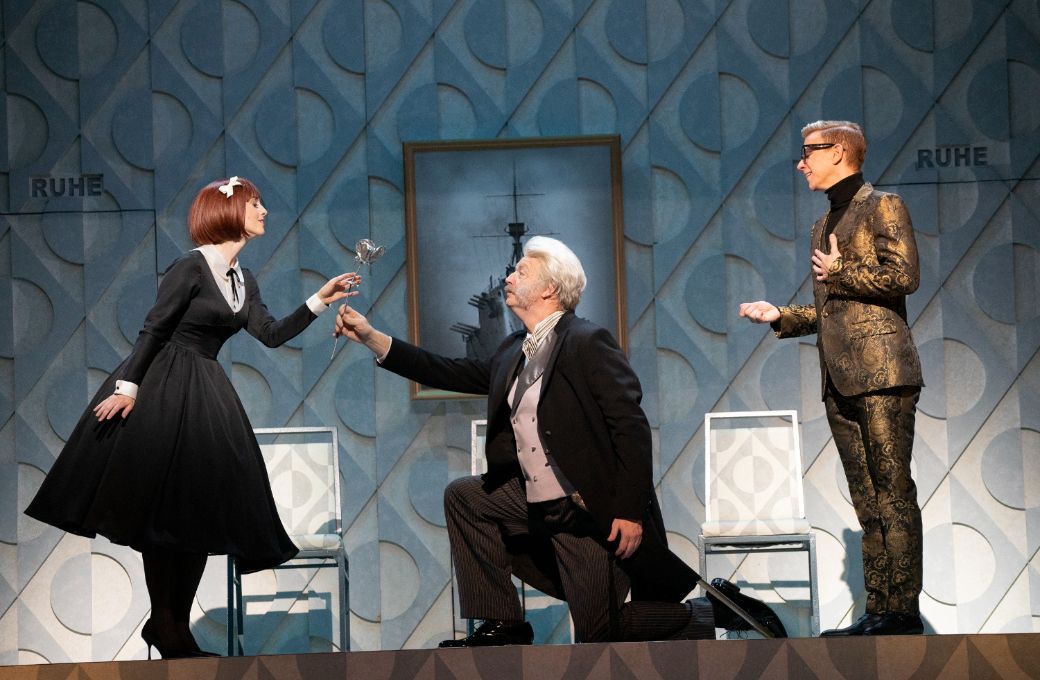Richard Strauss' Die schweigsame Frau was first presented in 1935; Hitler and Goebbels refused to attend because Stefan Zweig, the librettist, was a Jew and Strauss refused to remove his name from the program after the Nazis had insisted it be excised. It was a great success but was withdrawn for just that political reason after only three performances. It was not played again until 1946. Zweig never got to see the opera on stage. He left Austria for England in 1934; in 1940 he came to the United States and then Brazil. Eventually, his accurate sense of foreboding doom for the future overcame him and he killed himself in February 1942.
The plot is almost identical to Donizetti’s Don Pasquale except that the “old man” is not a fool here and his relationship with his nephew, Henry, is loving. It is more human and tender but still has bite. All the old man, Sir Morosus, wants is silence – even the sound of church bells torments him. His nephew comes to stay, bringing with him his theater troupe, a noisy, fun-loving bunch, and it enrages Morosus. As in Don Pasquale, a sham marriage is arranged: old man is duped by nephew and friend (a barber in this case) into “marrying” a young, very quiet woman named ‘Timidia’ (ha!), really Aminta, Henry’s wife. She immediately becomes noisy and difficult; they “divorce” and everyone is happy. Despite its large scoring (no Ariadne, this), you’re never overwhelmed by sheer sound except when Strauss is making a point about noise. Horn solos are prominent, wind canoodling is adorable. There's a lot of orchestral and chatty galumphing – this may be comic, but it's still German. It is chock-full with almost Rossinian ensembles, wild vocal lines for high sopranos, two gorgeous love duets, a tenor aria, a soprano aria, and a final aria for Morosus that touches the heart.

Both Zweig and Strauss thought that the opera as composed was too long, and it is – over three hours of music, with many repeats in the loud ensembles that are tormenting Morosus, and character moments for minor roles. It was severely cut for those first and subsequent performances. Bard’s always courageous Music Director, Leon Botstein, never one to shy away from a challenge, has opted to present the work uncut (with, as he has written, very small excisions) and what we get is a Straussian cornucopia that is presented in acts that are 68, 90 and 65 minutes long. As witty as it is, as engaging as it is, Die schweigsame Frau is still a superficial farce, and it eventually becomes simply too weighty. Sometimes scholarship should bow to practice, especially if the composer and librettist were on the side of practice.
That said, Bard has engaged director Christian Räth to unravel the tangles and he does so joyfully and tellingly and one remains engaged. He opts to turn the show into an opera within the opera, and we watch the cast change scenery, search for their costumes in full view (on a stage-width rack fabulously labeled with all of Strauss’s other operas). When Morosus is choosing among three “quiet” candidates for a “silent wife,” there is actually a Silver Rose Presentation. An “in-joke,” but these are theater people after all. And the word “Ruhe” (Quiet) is omnipresent in red neon throughout. Mattie Ulrich's costumes are a brilliantly colorful hodgepodge, a feast for the eyes.
And what a wonderful, ensemble cast, albeit with stars as well, that Botstein has assembled. Harold Wilson as Sir Morosus, who only wants quiet, is both dignified and blustering and his range covers the high F sharp and the low D flat required. Henry is David Portillo, a Mozart-type tenor with strength above the staff – the role takes him to high A and B flat frequently – and the tone is bright and attractive. Edward Nelson as the Barber is a new member in the long line of bright, lithe American baritones who are as comfortable acting as they are singing. Aminta is a Zerbinetta-like role, wildly high with staccato, and Jana McIntyre is tireless, filled with charm. The expected edge in her very top serves the situation well. Her love duet with Portillo, which she concluded on an endless pianissimo high D flat (which Morosus repeats octaves below), was breathtaking. Matthew Anchel’s pitch-dark bass was a standout as Vanuzzi and the rest of the cast performed with verve and playfulness, always singing, never mugging. The ensemble work, thanks to Botstein and chorus master James Bagwell, was close to miraculous.
The two recordings of the opera that I own, both from European live performances, are cut: one by 50 minutes, the other by 30. The drama in each remains intact, and now that we’ve experienced the complete work, it may be time to get out the shears again.


